Sherlock Holmes and the Seven Deadly Sins Murders Read online
Page 6
“And now, if you will excuse us, Dr. Watson and I have a visit we must pay.”
“Oh, and where’s that, Holmes?”
“To the British Museum, old fellow. It’s time we brushed up our Sanskrit …”
Chapter Six
The British Museum has perched on its Bloomsbury site like a comfortable beehive since 1753 with the worker bees of all nations happily buzzing in and out about their business. By late morning Holmes and I were two of them.
I freely admit I find the place a little daunting on the rare occasions I’ve visited it. All that antiquity is too much for a simple soldier to take in. Give me something I can get my hands on any time. Holmes, however, revels in it and, when a case demands research, I have known him spend days at a time there, returning to Baker Street overflowing with enthusiasm for some abstruse subject that he then tries to explain to me. This is a process that invariably ends with him raising his eyebrows in despair with the cry—“Watson, I declare you have no soul!”
This morning, as we climbed the steps to the main door, he clearly knew his destination. Instead of proceeding straight ahead to the main Reading Room, he set a determined pace through a maze of departments.
It was as though we were on a Cook’s tour of the past. One moment we were in the heart of Ancient Egypt, as we passed among mummies, sarcophagi and temple friezes. The next we were in the glory that was Greece and a moment later, or so it seemed, Greece had been conquered by the might of Rome. If I had taken more notice during my history lessons at school, I’m sure it would have all fitted into place. As it was, I was left feeling more than a little diminished. In their day each of these civilisations had ruled the known world and the men whose artifacts were now gathering dust thousands of miles away from their homeland had assumed that their various gods had intended that it would always be that way. Would the mighty British Empire inevitably come to the same resolution? Surely not.
As I was contemplating such weighty matters, Holmes came to a sudden stop.
“Here we are, my dear fellow. The font of knowledge.”
We were in one of the side passages and one that was rather dimly lit. Presumably this by way of being an economy measure, since I had the distinct impression that we were in one of the Museum’s by-ways rather than its highways.
We stood in front of a door with the legend in faded gilt letters—ORIENTAL & ASIATIC MSS.
Holmes rapped firmly on the door. Silence.
I scrutinised the smaller type—HOURS 10.00 A.M.—5.00 P.M.
“There should be someone there at this hour, Holmes. Try again.”
He did so and now we heard a shuffling sound from within and a moment later a quavering voice called for us to come in.
Like everything else about the Museum, the room was bigger than one had expected. Tall shelves piled high with boxes and folders receded into the far distance and bore a distinct air of the accumulated dust of generations. Tables were submerged with further piles of paper, presumably awaiting the ministrations of a cataloguer.
Then from behind a row of shelves a man appeared, adjusting a pair of wire-rimmed pince-nez and for the second time that day I was put in mind of Alice, as he had in his hand a pocket watch, which he shook and put next to one ear. If he had said—“Oh, my fur and whiskers!” I should have known him for the White Rabbit.
“A thousand pardons, gentlemen, but I was deep in an early Middle Eastern text and did not hear your knock. I do hope I haven’t kept you waiting too long but in my field—as I’m sure you can imagine—time is almost entirely past tense.” And he gave a little laugh to emphasise his witticism.
“Pray don’t apologise, my dear Mr.—” Holmes raised a hand in polite protest.
“Hinckley.”
“Mr. Hinckley. My colleague, Doctor Watson and I are grateful to you for seeing us without the benefit of an appointment but our business is of an urgent nature.”
Then with a most untypical, almost roguish display of bonhomie, Holmes leaned over to peer at the manuscript Hinckley had tucked under his arm.
“I wonder if I might …?”
And with that he had plucked the document away and was peering at it intently, for all the world like a desiccated professor himself.
“Ah, as I thought—Early Armenian. Fifth Century B.C., I’ll be bound. No, I’m wrong—late fourth century. Oh, my dear fellow, if only the world knew the linguistic sophistication of these people. I envy you your lot in life, I really do, locked away with minds of this calibre. Perhaps on some future occasion, you might find the time to compare notes. I have some early Coptic scrolls on which I would value your expert opinion.”
He carefully replaced the document under the man’s arm. Hinckley, I must say, looked a trifle surprised at my friend’s behaviour, as well he might.
“Now,” Holmes rushed on with the breathless enthusiasm of the true academic, “I’m sure this won’t take two seconds of your time. My colleague and I are anxious—for reasons I won’t bore you with—to identify the book in this photograph …”
He took out of an envelope the enlargement we had been studying and handed it reverently to Hinckley, as if it were the Old Testament itself.
There was a glint as the librarian adjusted his glasses. It was the lens catching the light but I could have sworn that there was something in his eye that had not been there before, as he examined it.
“There it is, do you see?” said Holmes, poking the relevant section with a bony finger, though the book was quite evident. “We’re virtually certain that the script is Sanskrit but we need to know what it says.”
Hinckley pursed his lips and made that little humming noise that seems inseparable from all professional pronouncements. Having peered at the photo for several moments, he handed it back to my friend with a shake of the head.
“I’m sorry to disappoint you, gentlemen, but what you have here—or rather, what that gentleman in the picture has there—is simply a manual of botany. A common household item at the time.”
“Which would be?”
“Oh—um—third century B.C.”
“Well, Watson, I’m afraid you win your bet.” He turned to Hinckley with a conspiratorial wink—quite unlike Holmes. “The Doctor and I have had a small bet, you see. I was convinced the book must have some religious significance but he insisted it did not. I’m afraid you have cost me the price of a good lunch. Doctor Watson is not to be fobbed off with less. Anyway, thank you for your time, Mr. Hinckley. And now we really must let Mr. Hinckley get back to fifth century Armenia. Come, Watson …”
And before I knew it, we were out of the door and back in the corridor with Holmes hurrying me along with his hand under my elbow, until we had turned the corner.
“What on earth was all that about, Holmes?” I gasped, quite out of breath.
“Oh, just a conversation with a killer. Our killer.”
“Hinckley—our killer? But I don’t understand …”
“My dear fellow, I had assumed you realised immediately that the man we met was not the real Hinckley. No, this fellow—whoever he is—has been following us ever since we left Baker Street. He was sitting in a hansom that had been standing a little way down the road ever since I got up this morning. Must have cost him a pretty penny, since he had no idea when we might be expected to leave.
“He got out of the cab when he saw Lestrade leave, realised we were not with him, then got back in. You’ll remember that when we did depart, I insisted on walking a little before I hailed a cab?”
“That’s right. I did wonder. You usually insist on getting one right outside the front door.”
“That was so that we had occasion to pass his cab and get a look at him. We took him a little by surprise there, I think. He raised a newspaper to hide his face, but not before I’d got a quick look at it and confirmed thjat he is the man who came into the dining room in Scotland.”
“Great Scott, Holmes—are you sure?”
“Reasonably so, old fellow. T
he man has a distinctive shape to his ears. The lobes are imperforate. I observed it when he passed our table that evening. I commend the study of ears to anyone who wishes to detect crime. No two pairs are quite identical. They mark a man’s individuality more clearly than anything else, including his fingerprints. Yes, it’s our Scottish friend, right enough.”
“But why is he following us?”
“To see how much we know, I suspect. So I thought it wise to let him have one end of the thread. When he has one end and we hold the other, it is a moot point as to who is pulling whom.
“You may have wondered why I explained to you in such great detail as we entered the building what we were about to do?”
“Yes, it did occur to me, now you mention it. It’s not like you to waste words.”
“That was for our friend’s benefit. He was walking just behind us. It was also the reason I took such a tortuous route to reach the department—to give him time to get there first. Which he only just managed to do. I must admit that I was distinctly relieved to hear that noise when we arrived. That told me my supposition was correct and that we were about to meet the ur-Hinckley—the genuine article being temporarily indisposed.”
“But wasn’t our man taking an awful risk?”
“Not really, Watson—and certainly nothing comparable with the other risks he has been taking lately. It was safe for him to assume that neither of us knew the real Librarian. After all, how often do you pop in for a quick Sanskrit translation?
“No, his impersonation did not lack boldness but in most other respects it was amateurish in the extreme. Even though it was contrived on the spur of the moment, I could have given him so many pointers …”
“For instance?”
“For instance … if the man you are impersonating habitually wears pince-nez, they will leave a discernible indentation on the bridge of his nose. One must either create that same impression with make-up—assuming that you do not wear them yourself—or refrain from removing them, once you have them on.
“That is fundamental but simple. Much harder to have to fake an expertise you do not possess. The document he claimed to be studying was not Armenian, fifth or any other century. It was clearly written in Aramaic, one of the oldest languages in the Semitic group, and the tongue used by Jesus and his disciples. The merest neophyte student of ancient languages would have known that.”
“But what about the Sanskrit—and the book?” I asked. “He seemed to know about that.”
“He knows about as much Sanskrit as—Mrs. Hudson,” Holmes retorted. “Botany—fiddlesticks. My own knowledge of the language is by no means extensive but even I know that the inscription says THE BOOK OF KOR. It merely remains to determine precisely what that signifies. Which I propose to do as soon as you have gone.”
“Gone? Gone where?”
Holmes pointed in the direction of the room we had just left.
“The Hinckley clone thinks we have bought into his deception. Having given us time to leave the vicinity, he will continue about his business. I wish to know what that business is.
“I want you to follow him, old fellow, and see where he goes—the hunter hunted.”
“And you, Holmes?”
“Once you have both departed, I shall rescue the real Hinckley, who, even now is, I suspect, cursing his fate in one of his own cupboards. And from him I hope to learn the meaning of the Book of Kor.
“Listen—I think that is the door opening. I rely on you implicitly, Watson. Happy hunting!”
Before I could say another word he had vanished into the labyrinth of corridors. I had just enough time—and presence of mind—to slip into the next room I found, as the hurrying footsteps of someone I presumed to be ‘Hinckley’ approached.
Safely inside with the door opened a mere crack, I verified his identity s he passed. Gone—as Holmes had predicted—were the wire pince-nez. In place of the affable academic was an expression of grim determination and—did I imagine it?—a touch of concern.
Then from behind me a woman’s voice enquired—“May I help you, sir?” I turned to find the female equivalent of what I imagined the genuine Hinckley to be, peering at me benignly from behind her desk.
“Ah, thank you, madam,” I said and then added the first thing that came into my head. “I was under the impression that this was the Gentlemen’s Wash Room but I see I was mistaken. Good day!”
And with that, I was gone.
In the distance, far down the corridor I saw Hinckley turn a corner and, once again, I found myself thinking of the White Rabbit. I set off in pursuit and soon realised the truth of what Holmes had been saying. We were, in reality, quite close to the museum’s main entrance. He had led us all around the houses to reach our destination.
When I reached the great doors, Hinckley was descending the wide steps leading to the courtyard and the thoroughfare beyond. Fortunately, the flight was wide enough for me to hasten down one of the sides without his seeing me. As he passed through the iron gates I was close behind him, using a party of tourists to screen me from him, should he decide to turn around. But it clearly never occurred to the follower to think that he might himself be followed.
He raised a hand and whistled to a passing hansom. A moment later it was trotting away in a southerly direction.
As soon as the wheels began to turn, I beckoned to another and jumped in, giving the driver the direction I had always hoped to have the occasion to utter—“Follow that cab!”
On we proceeded at a steady pace. Along Shaftesbury Avenue to Piccadilly Circus, where I fully believe that you really will meet everyone you’ve ever known, if you stand there long enough.
Over to my left as we turned into Piccadilly itself the Criterion Bar. I recalled, as if it were yesterday, the evening I wandered aimlessly into there, soon after my return from that abortive Afghan War, where I ran into Young Stamford. Hearing of my need to find lodgings I could afford on my niggardly Army pension, he whisked me round to see a friend of his who was desirous of sharing a nice suite of rooms.
By such a casual coincidence was I to meet Sherlock Holmes. Seven years ago—seven years in which so much had happened.
The thought of Holmes brought me back to my present mission.
The cab in front was making good time but seemed in no particular hurry and there was certainly no sign that my quarry had any idea that he was being followed. On the other hand, I had no opportunity to study him, since he had the blinds of the vehicle firmly pulled down—a somewhat strange act in itself, since the day was distinctly overcast.
Now we were circling Hyde Park Corner and bearing left into the maze of streets that lead to Victoria. Was Hinckley—for I could not put another name to him—making for the station as a means of escape? Somehow I thought not. If Holmes’s reconstruction of events was correct, the man’s mission was far from over. It was much more likely that I was chasing the fox back to his earth.
If so, it was a somewhat luxurious one, for the cab rolled to a halt outside No. 36 Eaton Square, an imposing residence that had clearly been converted into luxury apartments. From the front door issued a uniformed concièrge, who hurried to open the cab door.
I had instructed my own driver to stop several yards further back, so as not to arouse suspicion. As a result, I was unable to hear the exchange of remarks between passenger and concièrge, but I gained the distinct impression that the servant was surprised to see Hinckley, even though he obviously recognised him. At one point he looked back at the building he had just left, as though puzzled, then returned to the business of helping Hinckley descend from the cab.
Except that it wasn’t Hinckley who stepped out of that hansom!
This was a man with a full head of salt-and-pepper hair and beard and moustache to match. He wore spectacles with heavy black frames and, as he moved towards the building, I saw the reason for the concièrge’s concern. This man limped slightly. The concièrge offered his arm but the limping man brushed it aside somewhat brusquely
and hastened up the steps and into the house. The concièrge followed more slowly, looking more than a little discomposed.
My mind was in a turmoil. Had I followed the wrong cab? But no, I had made mental notes of certain marks on the back of the vehicle—a trick I had picked up from Holmes—and this was the hansom Hinckley had hailed outside the British Museum, right enough.
Had I been daydreaming on the journey and failed to notice a substitution of passengers? Possible, I concluded, but highly unlikely. I had been on the qui vive ever since I received Holmes’s instructions.
So what was the explanation of what I had just witnessed?
The solid sound of the front door being closed told me that one thing was certain. There was nothing more to be gained by waiting here. At least I now had an address that seemed to have something to do with our investigation, if only I knew what.
I instructed my driver to continue on to Baker Street, as I continued to seek an explanation in vain. Then, as we approached the Park, it occurred to me that Holmes would probably be some time about his business at the Museum. I determined to take a turn in the Park and walk the rest of the way home. Accordingly, I had the driver drop me at the nearest gate and set off briskly. Perhaps the fresh air would clear my mind.
At times like this I am inclined to take a fresh look at my fellow men and women. How much we normally take them for granted as part of the scenery, as we pass among them. And yet each of them is an intrinsic part of—wasn’t it Balzac who called it the comédie humaine? That young soldier over there, walking with his girl … that shabby elderly man conversing with himself … that respectable pair of matrons walking their dogs … each of them has a story, be it a comedy or a tragedy. Or, as is far more often the case, something of a cross between the two.
Saints and sinners rub shoulders with one another and most of them go by us unnoticed until we have need to seek them out—or they make it their business to seek us out.
It was at this point in my reverie I became aware that I was myself being followed. For some minutes I had been vaguely aware of the clip-clop of horses’ hooves just behind me and I had registered that a cab was about to pass me. Now I realised that it was keeping a discreet distance behind and matching my pace.

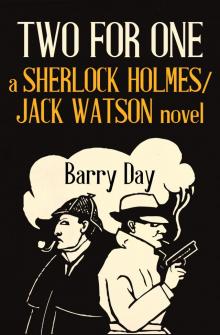 Two for One
Two for One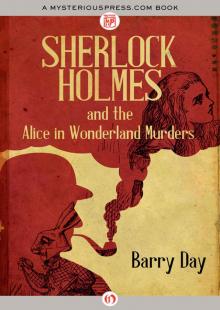 Sherlock Holmes and the Alice in Wonderland Murders
Sherlock Holmes and the Alice in Wonderland Murders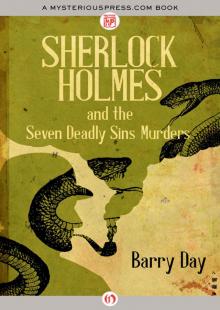 Sherlock Holmes and the Seven Deadly Sins Murders
Sherlock Holmes and the Seven Deadly Sins Murders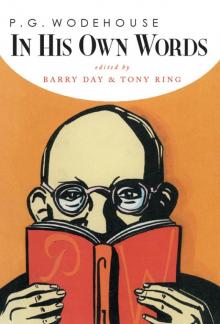 P.G. Wodehouse in his Own Words
P.G. Wodehouse in his Own Words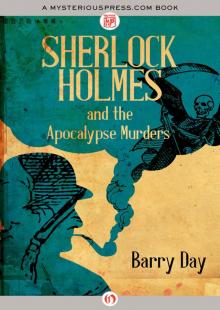 Sherlock Holmes and the Apocalypse Murders
Sherlock Holmes and the Apocalypse Murders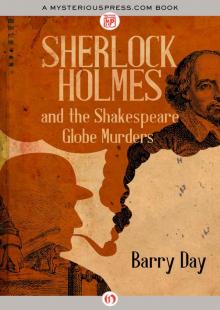 Sherlock Holmes and the Shakespeare Globe Murders
Sherlock Holmes and the Shakespeare Globe Murders